10 Best Stud Finders in 2022
Find any Metal or Wood Stud with the Best Stud Finders on the Market
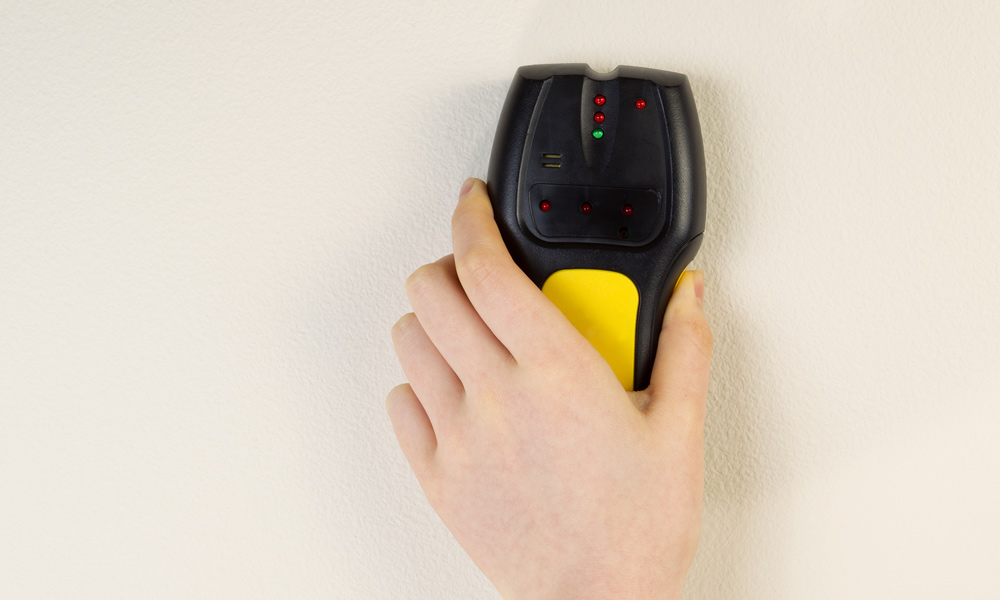
If you’re looking to do any major DIY work in your home or at work, you’ll need the best stud finder you can get. This nifty little gadget will help you find studs behind the surface of your walls. Even though stud finders are an essential part of DIY work, to the untrained eye, it can be hard to tell the difference. Distinguishing between a good stud finder and a bad one can be difficult and time-consuming.
We’ve done extensive research to help you work out which options are the best for your needs. Below, you’ll find our best stud finder reviews, where we will discuss our top 10 stud finders in depth. Each stud finder review will break down the most important features to help you understand what you’re looking at.
Check out our helpful buyer’s guide, where we’ll talk you through some of the most important things you should bear in mind when choosing a new stud finder.
View the Best Stud Finder, Below.
- Franklin Sensors FS710PROProSensor
- VAYYAR Walabot DIY – In-Wall Imager
- CH Hanson 03040 Magnetic Stud Finder
- Zircon StudSensor e50 Electronic Wall Scanner
- VIVREAL Stud Finder Wall Scanner
- The StudBuddy Magnetic Stud Finder
- Bosch Digital Multi-Scanner GMS120
- BLACK+DECKER BDL190S BullsEye Stud Sensor
- Ryobi Whole Stud Detector ESF5001
- DEWALT 3/4 in. Stud Finder
1. Franklin Sensors FS710PROProSensor
Best Stud Finder for Accuracy

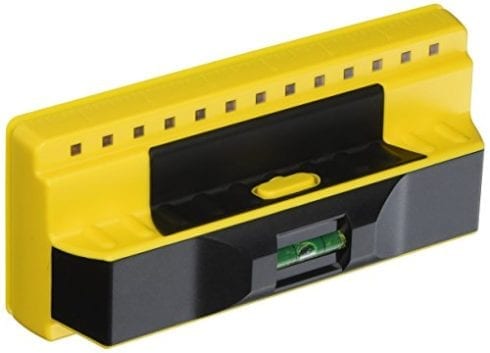
The Franklin Sensors ProSensor is one of the fastest and easiest to use models of stud finder out there. However, this high quality comes at a price - it's an expensive tool, but the accuracy and efficiency are more than worth the cost.
Scanning 13 points simultaneously, rather than the more common 1 or 2, this stud finder can display the entire stud. It'll show the locations of all of its edges, rather than just showing a single edge. This gives this Franklin stud finder a much faster and more accurate stud detection function, making it easier to use and more accurate than any other stud finder out there. This almost completely eliminates the false positives that are so common in other stud finders.
You can also use the Franklin Sensors Prosensor to locate studs instantly without calibration, significantly speeding up the process.
Check Price on Amazon ➞2. VAYYAR Walabot DIY – In-Wall Imager
Best Stud Finder for Android Users - Comes with an App
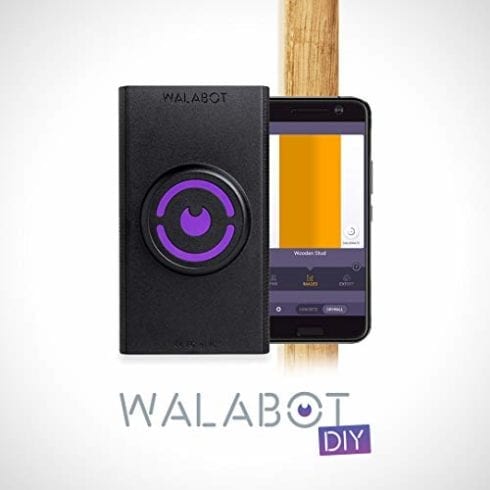
The VAYYAR Walabot DIY In-Wall Imager offers something a little different to most stud finders. It uses cutting-edge radar technology to see inside concrete or drywall walls, finding drywall screws and studs. However, it does not currently support scanning lath and plaster walls.
Its 4-inch scanning depth is far greater than that offered by most competing models of stud finder. It offers three different in-wall sensing modes (images, panoramic, and expert) for more advanced wall scanning.
It works to find studs via an Android app that allows you to save scans and images for future reference. This adds significantly to the versatility and utility of this device. It's worth noting that the app is not currently iPhone compatible, but its Android functionality is impressive and well worth taking a look at.
The VAYYAR Walabot DIY In-Wall Imager stands out from the crowd. Map the entirety of a wall for future reference, giving you the best sense of stud layouts.
Check Price on Amazon ➞3. CH Hanson 03040 Magnetic Stud Finder
Best Earth Magnet Stud Finder
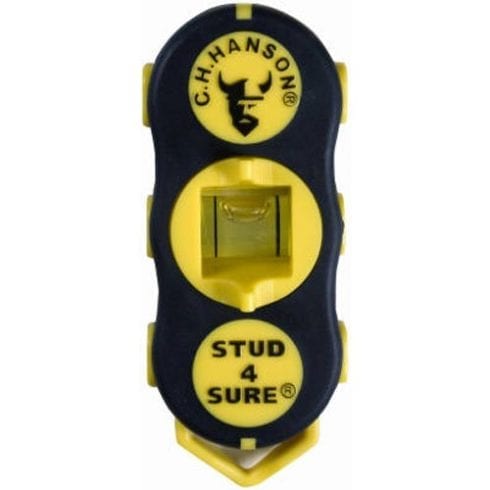
The CH Hanson Magnetic Stud Finder is a fast, powerful, and easy-to-use model that offers excellent performance at a low price. This relatively inexpensive stud finder functions through a system of rare earth magnets rather than an electronic detection system. This allows for fast and reliable detection with no calibration required.
The build is durable to help it stay fully functional even when dropped. The ergonomic body offers a tight grip and a comfortable user experience. This Hanson Magnetic Stud Finder also features a small, spirit-level component that you can rotate vertically or horizontally. This feature is excellent for leveling pictures and mirrors or finding studs.
Inexpensive and fast, the CH Hanson 03040 Magnetic Stud Finder might not be the most advanced model out there, but it gets the job done quickly and effectively with ease. It's a great choice for people on a budget.
Check Price on Amazon ➞4. Zircon StudSensor e50 Electronic Wall Scanner
One of the Best Stud Finders for Those on a Budget
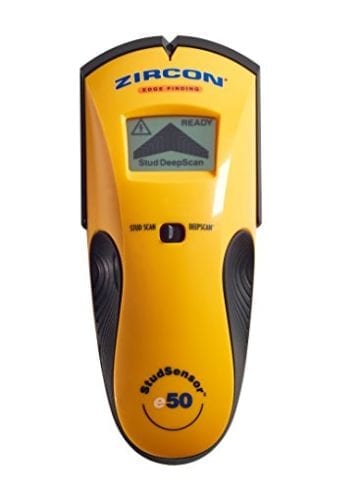
If you're looking for a stud finder that's affordable and easy to use without all those extra features, then the Zircon StudSensor e50 is a great choice. This is a basic stud detector with no frills, but offers accurate detection of both wood and metal studs.
Like most electronic models, this Zircon stud finder features a regular stud scan mode for most studs up to 0.75 inches deep. There's also an alternate deep scan mode that locates studs up to 1.5 inches deep. It can also detect live AC wiring in your walls to help you avoid drilling into dangerous electrical elements and stay safe.
Be aware that this stud finder requires a battery to operate.
This is a good-quality stud finder at a budget price that offers all the basic functionality you'll need for simple home DIY projects. Tackle all those wall studs with ease.
Check Price on Amazon ➞5. VIVREAL Stud Finder Wall Scanner
One of the Best Stud Finders for Multiple Tasks
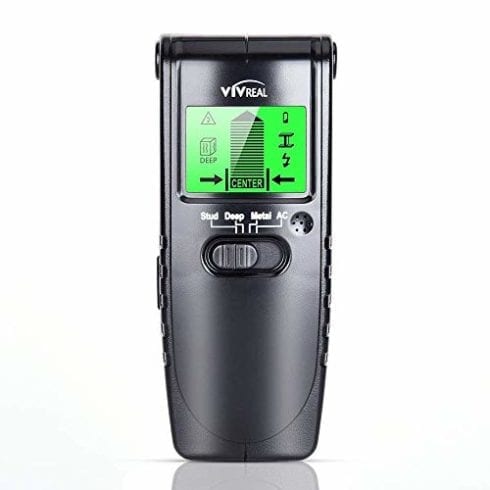
The VIVREAL Wall Scanner is a powerful and versatile stud finder. Like most electronic models, it is easy to use in any situation. It offers four scanning modes for different functions. Complete four various tasks simply by switching between modes.
These modes are as follows: a stud scan for finding wood or metal studs located up to 0.75 inches deep, and a deep mode for locating deeper studs. You also get a metal scan for locating larger metal objects and an AC scan for finding live AC electrical wires at depths of up to 2 inches.
This electronic stud finder also features automatic calibration and an audible warning tone when it detects studs. Access the results on an easy-to-read LCD display screen.
Combining great functionality with ease of use, the VIVREAL Wall Scanner is a great all-purpose option that should provide good results for most situations.
Check Price on Amazon ➞6. The StudBuddy Magnetic Stud Finder
Most Simple Magnet-Based Stud Finder
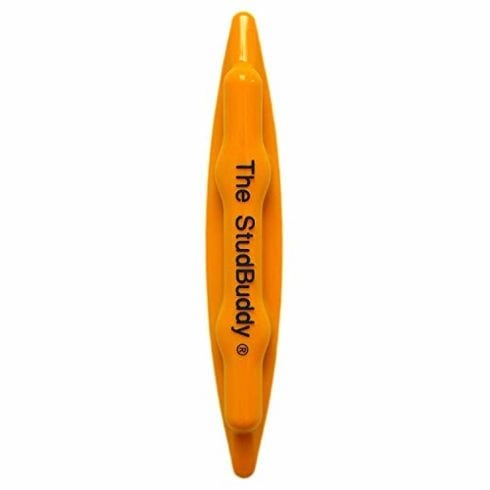
The StudBuddy Magnetic Stud Finder markets itself as the world's simplest stud finder, a claim which seems likely to be accurate. This incredibly simple device is compact and portable. It doesn't even require batteries or a power source to work.
The StudBuddy Magnetic Stud Finder uses powerful neodymium magnets to detect studs. It magnetically hangs on the wall over the stud once you have found it.
This is an easy-to-use stud finder that requires no expertise to work. It will make a difference to any DIY project.
This stud finder also takes up almost no space in your toolkit.
Check Price on Amazon ➞7. Bosch Digital Multi-Scanner GMS120
Best Stud Locator for Finding Multiple Studs
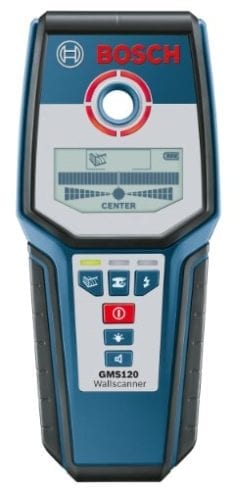
If you are working on a project that requires hammering or drilling into floors or ceilings, you'll need to see the support holding up those surfaces. The Bosch Digital Multi Scanner is an excellent choice for this particular problem.
This multi-scanning stud finder is comfortable to hold in awkward positions, making it easy to reach the floor or ceiling.
This tool can detect wooden or metal studs and other metal elements buried in the wall, ceiling, or floor. It'll also detect live wiring beneath the surface. Find any elements that could pose problems for drilling and other DIY actions.
Offering multi-mode detection that is ideal for scanning floors and ceilings for studs and other hazards, the Bosch Digital Multi Scanner GMS120 is an excellent choice for anyone in need of more advanced and comprehensive scanning.
Check Price on Amazon ➞8. BLACK+DECKER BDL190S BullsEye Stud Sensor
Best Stud Finder and Laser Level Combination
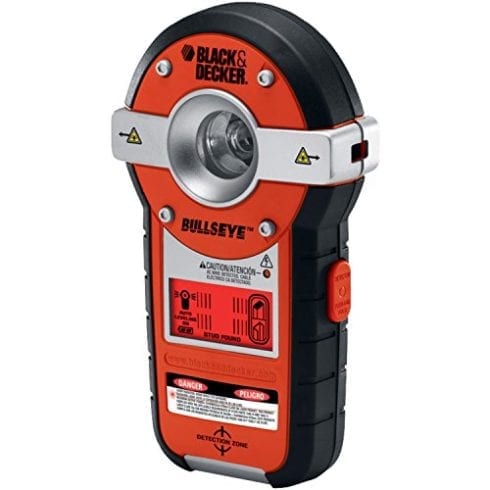
If you're looking for a stud finder with extra features, then the Black and Decker BDL190S is a good choice. Its core stud finder functionality is not particularly reliable, which is a significant mark against this stud finder.
However, its laser leveling functionality is effective and versatile. It's a great extra feature that adds a high level of utility to this stud finder.
This tool can detect studs, metal, wood, and live AC wiring and requires no adjustments to change between the different detection options.
Check Price on Amazon ➞9. Ryobi Whole Stud Detector ESF5001
Best Model for Finding Studs and Calculating their Depth
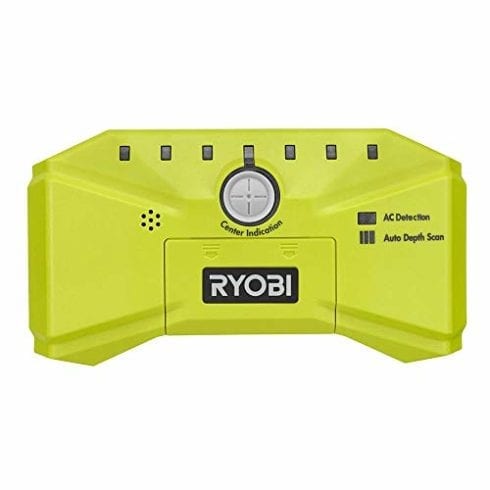
The Ryobi Whole Stud Detector ESF5001 is a simple stud finder with several neat design features that add great functionality to it.
The core functionality of this stud finder is erratic. Some units work perfectly, while others fail to detect studs successfully.
That unreliability aside, many features make this stud finder worth considering. Its auto depth scanner feature can not only detect studs but also indicate how far from the surface they are. The LED indicator lights show the width of any detected studs effectively.
Check Price on Amazon ➞10. DEWALT 3/4 in. Stud Finder
Best Model for Finding the Center of a Stud From any Direction
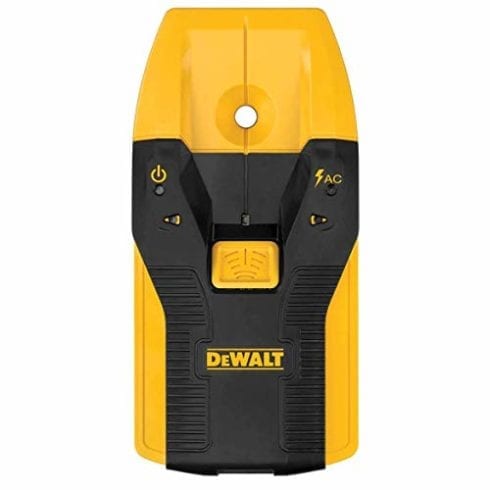
The DEWALT Stud Finder is a versatile tool that offers a wide range of different stud finding functions. Designed to find the stud's center, no matter what angle you approach it from, this stud finder is an excellent option. It will accurately find both wood and metal studs in various wall materials.
Once it's located the stud, this DEWALT model plays an audible alert sound to notify the user. In addition, directional LED arrows indicate the precise location of the stud itself. This offers easier identification and location.
With a range of handy usability functions to improve your user experience, the DEWALT ¾ in. stud finder is a great and comprehensive option for a wide range of situations.
Check Price on Amazon ➞Stud Finder Buyer’s Guide
What Types of Stud Finder are There?
Stud finders work to find studs in your walls. Some may even be able to locate wires and other components. There are two main types of stud finders available on the market, classified by the methods they use to locate studs: magnetic stud finders and electronic stud finders. Both of these types have certain advantages and disadvantages worth bearing in mind.
Magnetic Stud Finders
Magnetic stud finders work by using high-strength powerful magnets (usually neodymium) to locate the metal screws used to hold the stud in place. That means they’re a little less precise than electronic stud finders. But, the lack of electronic components make these magnetic finders more durable, reliable, and less likely to give false positives. The magnets also have a limit on how far they can detect metals. This means deeper studs may not register well on magnetic stud finders.
However, the big difference is that even a high-quality magnetic stud finder tends to be far cheaper than a decent electronic stud finder. So, if cost is a factor in your decision-making, you’re likely to want a magnetic stud finder.
Electronic Stud Finders
Electronic stud finders work through a system of sensors that detect changes in the electrical conductivity of the wall. This means they detect areas of different density and conductivity, such as studs, and showcase the reading on an LCD screen. As a result, these electronic models can often penetrate further into the wall than a magnetic stud finder, but this comes at the cost of reliability.
Many cheaper models of electronic stud finders are prone to false positives. These electronic systems are more fragile and easily damaged than magnetic stud finders. Electronic stud finders can detect other features in your walls, though, and they may be more versatile than their magnetic counterparts in some situations.
What to Look for in a Stud Finder
Stud Location
In most cases, you’re going to be looking for studs in the walls of your building. If this is the case, pretty much any stud finder should do the job, as they’re all designed for use on walls.
However, sometimes you’ll need to look for studs in the floor or ceiling of your building. If that is the case, your regular stud finder won’t cut it, and you might need a more advanced model. Floor studs can be buried deeper beneath the surface, and more basic stud finders might not have the strength to detect deeper studs in the floor. You’ll need something a bit more powerful, which usually comes at a premium cost.
It’s also worth considering the grip feature on your chosen stud finder, as looking for studs in the floor or ceiling often requires holding your tool at a different angle. Unless your stud finder has been designed for a comfortable grip at alternate angles, this can be uncomfortable.
Types of Stud
Studs in walls are made from various materials, and certain stud finders are only calibrated for finding specific types of studs. Being aware of which type of stud you are looking for will make the calibration and location process far easier.
Most home walls are made with wooden studs, but many commercial buildings have heavier-duty metal studs.
Some scanners won’t just detect wood and metal studs – they will also locate electrical wire or metal pipes. This is a great feature to have if you’re concerned about your safety.
Alternate Materials
In some rare cases, buildings may even have plastic studs built into the walls, which are much rarer and therefore less likely to be supported by the detection technology used in any given stud finder tool.
Key Features and Other Considerations
Many stud finders come with additional features to make the process of finding studs even easier. Some have features such as a deep scan mode, to find deeper studs. Some finders will detect only the edge of the stud, whereas others will detect the center.
You may find some feature laser-level capabilities, such as a built-in bubble level. So if you’re trying to hang a picture frame, you can avoid studs and make sure it’s even all at the same time.
Some may require two AA batteries, and others may not need a power source at all.
Other Ways to Find Studs
In addition to magnetic and electronic stud finders, there is an old-fashioned method you could try for stud detection. It’s not always accurate and won’t work on every wall, but it might be your best option if none of your stud finders are working properly.
If you rap your knuckle against the wall, it will make a fairly hollow tapping sound. When you rap just over a stud, that sound changes to a more solid noise, which you can use to indicate where the studs in your wall are located.
Stud Finding Tips
You can also often use electrical sockets as a rough guide. Sockets are usually placed next to a stud. Also, as most people are right-handed, most electrical sockets are located to the right of a stud rather than the left.
That means you can usually find a stud just to the left of an electrical socket. That being said, not every electrician is right-handed, so this is not a 100% reliable method. You’ll always always run the risk of finding a socket that has been installed by a left-handed electrician, and has the stud to the right of it.
You might think a stud finder isn’t a necessary tool, but you’d be wrong. The construction of walls is a precise and complex system, and you don’t want to drill into the wrong part of your wall!
The walls in older houses (pre-1960) are often thicker, with studs sunk deeper behind the surface. That means that the older your house is, the higher quality a stud finder you will need in order to get good results!